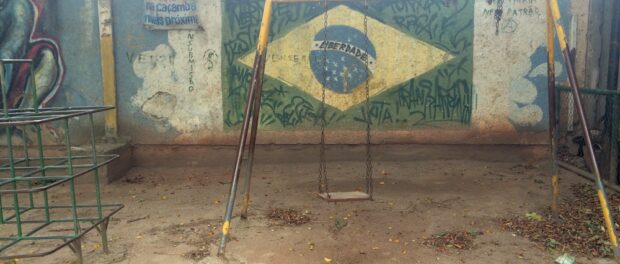
Psychological pressures intensify in Vila Autódromo after the community’s ping pong table was demolished and children’s playground is under threat.
The psychological stress on residents in Vila Autódromo, next to the 2016 Olympic Park, continues to increase as bulldozers are now a regular presence in the neighborhood. At the beginning of the week, Vila Autódromo saw the widely used community-made ping pong table smashed in seconds. The event is seen as a symbolic act of pressure and intimidation towards remaining residents resisting eviction, just over a week after five homes were demolished without warning on October 23.
As with last week’s evictions, no prior warning was given to residents about the municipality’s intended actions. Resident Luiz Carlos said the demolition “started at 7:30am in the morning without any warning and because no one was there [near the table] they removed everything.” This included a fence residents had put up to protect the table and next door community playground on Saturday, October 24.
Luiz continued: “[The Olympics] is a mega sporting event and it doesn’t make sense they are destroying a ping pong table that was made for the children in our community. It’s an incredible contrast.” The table was a valuable part of the community. Luiz said: “We’d have barbecues and the ping pong table was to the side for all to play… we even had a tournament.”

The construction of another ping pong table was confirmed by the site manager the day after the original was demolished. At this stage no immediate actions have been carried out by the construction workers. Luiz finds this difficult to comprehend, “when they can put up these grand buildings in days.”
As a result, there are now growing fears in community about the removal of their one and only playground, that sits next door. “The playground is there for now, no one knows until when, but it’s in line [for demolition]–it could be next,” said Luiz Carlos. The owner of the kiosk that faces the children’s playground, who provides snacks to Olympic Park workers, believes the playground is sure to go soon.
As stated on the Vila Autódromo Facebook page, for a community who already has so little, this is an act of “cowardice, truculence and bad character.” Upset and feeling vulnerable, they explained “what the community builds the government destroys.”

Despite the residents’ legal titles to the land granted by the state government in the 1990s and Mayor Eduardo Paes’ public commitment to the permanence of the community in August 2013, and confirmed with the BBC as recently as August and O Globo just two weeks ago, Vila Autódromo has been targeted aggressively for near total removal. Evictions have removed 83% of the neighborhood in the last two years. Paes has repeatedly claimed that part of the community can remain, but a recent official Rio 2016 video projects the Olympic Park with Vila Autódromo completely removed.
The small group of remaining residents in Vila Autódromo are demanding respect and honesty. The promises made by Mayor Paes consistently seem hollow and residents are forced to negotiate and revise their expectations every day. Around 50 families are certain they will remain regardless of any offered compensation. The community continues to plan for their future and with the support of two universities has devised an upgrading plan (now in its fourth version) confirming residents want to, and can, co-exist with the construction of the Olympic Park.

The demolition of the ping pong table however has come as a devastating shock to many of the remaining residents. The importance of the public space for residents prompted an S.O.S as they stated, “we need help from everyone to stop the government’s violence.” If the children’s playground goes, “the community will have nothing,” Luiz explained.
The community, along with architecture professors and students from the Federal Fluminense University (UFF), have an event planned for the weekend of November 14-15, to ‘requalify’ the playground at Vila Autódromo. The event, planned last month, is part of a university extension program and will hold a collective weekend of action utilizing recycled materials collected by residents to regenerate the area.
Just last month UN-Habitat hosted a month-long initiative called Urban October including World Habitat Day on October 5 celebrated with the theme “Public Space for All.” As outlined by the UN: “Public spaces enhance community cohesion and promote health, happiness, and well-being for all citizens as well as fostering investment, economic development and environmental sustainability.” Furthermore, UN Secretary General Ban Ki-Moon stated: “Public spaces encourage people to communicate and collaborate with each other, and to participate in public life.” This is a crucial concern for Vila Autódromo as they continue their collective community battle to live alongside the Olympics.
The UN Secretary General highlighted that public spaces are “crucial for poor and vulnerable citizens. Improving access to them increases equity, promotes inclusion and combats discrimination.” In Vila Autódromo their public space has allowed them to host community events and welcome outside parties, including university students, agricultural groups as well as the general public. Resident Sandra Damias noted, “even those people who come from outside [the community] gather here.” In the face of these mounting pressures, residents continue to resist and fight for their permanence and their vital remaining public spaces.

